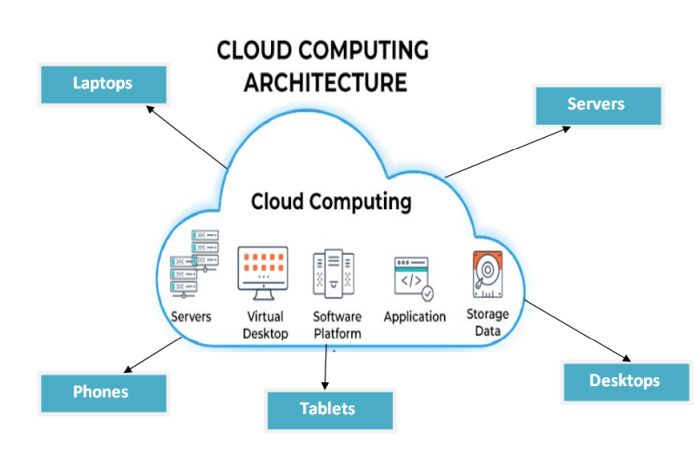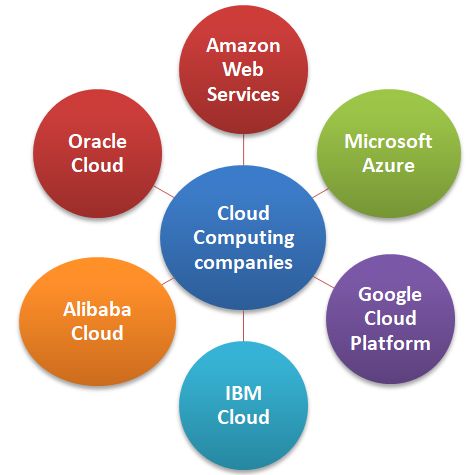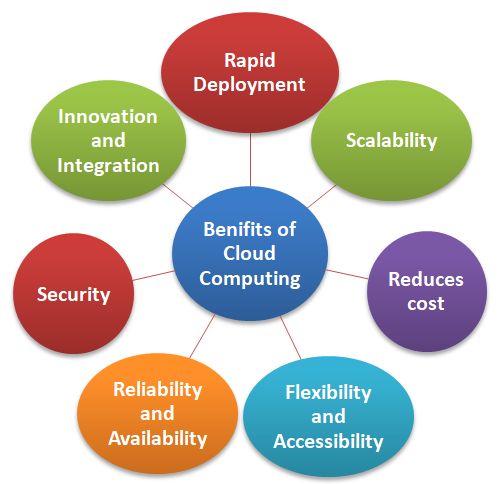Cloud Computing - Introduction
Every organization, whether it is an MNC or a startup, is using cloud computing, and many more are still moving in that direction because of the cost savings, the reduced maintenance requirements, and the expanded data capacity made possible by the servers managed by the cloud providers. Another factor contributing to the abrupt switch from on-premises servers to cloud providers is the delivery of user on-demand resources like servers, storage, and software over the internet. In simple words pay and use a service provider. The drawback of an on-premises server is that the business must continue to pay for it even if it is not in use.
Cloud Computing Introduction
Instead of using the computer's hard drive or a local server, cloud computing is used of storing and accessing data and programs on remote servers that are hosted on the internet. Cloud computing, often known as Internet-based computing, is a technique in which the resource is made available to the user as a service over the Internet. Any type of storable document, including files, photos, and papers, can be used to store data.

The following are some tasks that can be completed with cloud computing.
- Data storage, backup, and recovery
- On-demand software delivery
- Creation of new services and apps
- Audio and video streaming
Top leading Cloud Computing companies
The following are the top leading cloud computing companies.

- Amazon Web Services (AWS) -The cloud computing division of Amazon is called AWS. It provides a vast array of cloud services, such as computing power, storage, databases, machine learning, artificial intelligence (AI), analytics and more.
- Microsoft Azure -Microsoft's cloud computing platform is called Azure. It provides a full range of cloud services, including platform, infrastructure, and software services. Azure offers a wide range of services for developing, deploying, and managing applications and services and is known for its strong integration with Microsoft's ecosystem.
- Google Cloud Platform (GCP) - The Google Cloud Platform (GCP) is a cloud computing service provider that provides a broad range of cloud services, such as computation, storage, databases, machine learning, analytics, and more. GCP emphasizes its strength in data analytics and AI capabilities.
- IBM Cloud - IBM Cloud provides a broad range of cloud services, including infrastructure, platform, and software services. IBM focuses on hybrid cloud solutions, enabling businesses to integrate their on-premises infrastructure with cloud services. IBM Cloud offers AI-powered services, blockchain, IoT, and more.
- Alibaba Cloud -One of the top cloud service providers in China is Alibaba Cloud, a division of the Alibaba Group with an expanding presence outside. It provides a wide range of cloud services, including those for computing, storage, databases, networking, and AI.
- Oracle Cloud - Oracle Cloud provides a comprehensive suite of cloud services, including infrastructure, platform, and software services. Oracle emphasizes its strength in enterprise-grade solutions, including database services, enterprise applications, and integration capabilities.
Benifits of Cloud Computing
Cloud computing offers several benefits that make it more usful option for individuals and organizations. Here are some key reasons why should use cloud computing.

- Scalability - Cloud computing provides scalability, allowing you to easily scale your resources up or down based on demand. You can quickly allocate additional computing power, storage, or other resources as needed, without the need for physical hardware upgrades. This flexibility enables you to meet changing business requirements efficiently.
- Reduces cost - Cloud computing follows a pay-as-you-go pricing model, where you only pay for the resources you use. This eliminates the need for upfront hardware investments and reduces operational costs associated with managing and maintaining physical infrastructure. Additionally, cloud computing allows you to optimize costs by scaling resources as needed, avoiding over-provisioning or underutilization.
- Flexibility and Accessibility - Cloud services offer flexibility in terms of resource selection and deployment options. You can choose from a wide range of services and tools to meet specific requirements, such as virtual machines, databases, analytics tools, and more. Cloud computing also provides accessibility, enabling authorized users to access resources and applications from anywhere with an internet connection, fostering collaboration and remote work.
- Reliability and Availability Service- Cloud service providers typically offer high availability and redundancy in their infrastructure. They have multiple data centers located in different regions, ensuring that your applications and data remain accessible even in the face of hardware failures or disruptions. Service Level Agreements (SLAs) guarantee a certain level of uptime and performance, providing reliability for critical workloads.
- Security - Cloud service providers invest heavily in security measures to protect data and infrastructure. They employ robust encryption, access controls, and compliance frameworks to safeguard sensitive information. Cloud providers often have dedicated security teams and resources, which can be more effective than individual organizations' security measures.
- Rapid Deployment of applications and services - Cloud computing enables rapid deployment of applications and services. You can provision resources quickly and automate deployment processes, reducing the time it takes to set up and configure infrastructure. This agility allows organizations to accelerate their time-to-market, respond to customer needs faster, and stay competitive in dynamic business environments.
- Innovation and Integration - Cloud computing platforms often offer a wide range of additional services and tools, such as artificial intelligence, machine learning, big data analytics, and Internet of Things (IoT) capabilities. These services enable businesses to leverage advanced technologies and drive innovation without significant upfront investments. Cloud services also integrate well with existing on-premises infrastructure, allowing organizations to adopt a hybrid cloud approach and leverage the benefits of both cloud and local systems.
These benefits make cloud computing an attractive choice for businesses of all sizes.
Next
